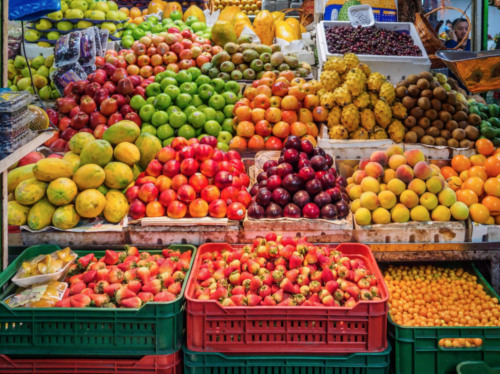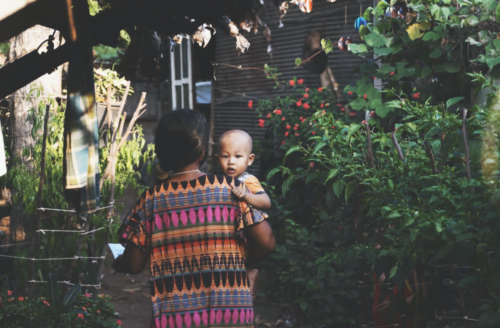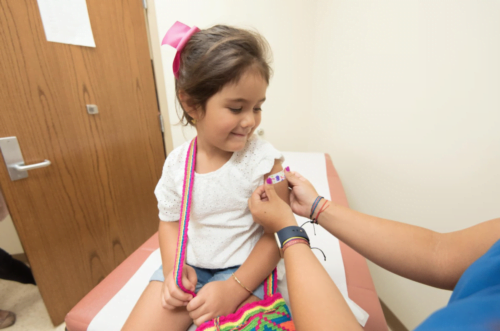Overall, vegan diets tend to be rich in fiber and low in saturated fats and cholesterol. Eliminating animal products from your life can also ensure you do not support the inhumane sourcing of meat. This refusal to participate in the animal product manufacturing industry may stem from your compassion for living beings or an effort to protect the earth. In some cases, veganism can also be a part of a person’s religious faith or beliefs. The bottom line is that veganism and vegetarianism benefit a person’s body, mind, spirituality, and planet. So why wouldn’t a parent choose this lifestyle for their children?
Nourishment of the Body

The Academy of Nutrition and Dietetics‘ official position is that an appropriately planned vegetarian diet can help prevent and treat certain diseases. Further, a strictly veggie-fueled diet is perfectly nutritionally sufficient for all stages of a person’s life, including pregnancy, lactation, infancy, toddler years, adolescence, and beyond. A vegan lifestyle can provide your body with all the essential nutrients it needs. All it takes is a bit of planning and the proper scientific knowledge.
For instance, the nutrition content of some foods can decline or increase depending on the method they are cooked. Vitamins like B12 and D are critical for a healthy lifestyle and integral parts of a child’s growth and development. Nutritional aspects like these that you must pay attention to as a vegan parent are not because plant food doesn’t contain enough nutrients. In many cases, the nutrients are present; your body just needs support from complementary vitamins to process them.
Thankfully, there are several simple ways to combat nutritional deficiency and make the most of your vegan or vegetarian diet. As we discussed in Green Parent’s “Are You Making These Green Parenting Mistakes?” it can be tougher for your body to extract non-heme iron (iron from plant foods) vs. heme-iron (iron from animal products). A vegan parent can quickly mitigate this by ensuring their child’s diet includes enough vitamin C. Vitamin C-rich foods help your body break down the forms of essential nutrients found in plants.
Many of the “dangers” associated with veganism are misconceptions.
Dairy foods are considered one of the primary sources of calcium despite the high calcium levels found in fortified soy, tofu, and dark green leafy vegetables. Common issues associated with a vegan diet, like not getting enough protein or not having enough energy, are symptoms of an unbalanced diet, not necessarily a vegan one. Omnivores face the same problems with malnutrition when their diet is not adequately planned. Regardless of dietary choices, every parent should be concerned with putting adequate nutrition into their child’s diet.
Not only does the American Academy of Pediatrics conclude that vegan and vegetarian diets are nutritionally sufficient for infants and children, but they report numerous health benefits. Examples of these health benefits include higher levels of nutrient-dense foods that provide essentials like potassium and vitamins A, C, and E. Additionally, several studies have reported the increased presence of fiber and antioxidants, both indispensable for your vegan kids’ healthy growth and development.
Nourishment of the Soul

One of the most common reasons that people decide to maintain a vegetarian or vegan diet is compassion. The universe we belong to intertwines us with all living beings, from the mushrooms under your feet to the cows grazing in the pasture. Nourishing your connection to the world around you means exuding kindness for every being. Unfortunately, the process through which animal products are sourced can be brutal and inhumane.
Thanks to eye-opening documentaries like Dominion and Cowspiracy, many people have become aware of some brands’ immoral practices. The conditions animals are kept in before slaughter are often cramped, dirty, and miserable. Some chickens are overfed to the point of being unable to stand or move around, which is a gut-wrenchingly sad way to exist.
Kids, especially young children, tend to have a closeness to animals that some adults lose as they grow older. When you teach your kids from a young age that all beings on planet Earth deserve to live healthy, happy lives, it is likely they will never want to eat animal products. Peace on Earth is achievable only when we can live in harmony with every living thing.
Cultural Considerations

It is worth noting that animal exploitation is not necessarily a part of every means of obtaining animal products. For instance, a small local farm that raises chickens for eggs and poultry is not necessarily unethical. Every person’s body and the religious way is different, so it is crucial to have compassion for all beings and refrain from judgment. A vegetarian diet is not suitable for everyone in the same way an omnivorous diet is not universally beneficial.
If your child’s diet has been challenging to maintain without the nutrients found in animal products, or you have a belief-related conflict, consider using only AWA-certified brands. AWA or Animal Welfare Approved is a certification given by the ASPCA to encourage omnivores to be mindful of their meat and dairy sources. Animal Welfare Approved certifications range from “Entire Life on Farm” to “Enriched Environment,” regarding the conditions where the animals were raised and handled.
It isn’t difficult for your child’s nutritional needs to be met with a vegan diet, even if they’re a picky eater. However, sometimes, you must be mindful of medical conditions or conflicting faiths or beliefs, especially in co-parenting situations. If you cannot avoid animal products for these reasons or due to a pediatrician or nutritionist’s recommendation, look to AWA products. Remaining mindful of the source of your animal products will uphold your morals and avoid supporting the terrorization of farm animals for human consumption.
Nourishment of the Earth

The torture of farm animals is not the only negative aspect of animal product manufacturing. According to a study reported in the documentary Cowspiracy, 7 million pounds of excrement are produced by animals raised for food in the United States. Some of this excrement ends up in our rivers and underground water supply. Corporate-funded agriculture is one of the biggest threats to our quality of water. Tyson Foods Inc. dumped 104 million pounds of pollutants into our country’s waterways between the four years of 2010 and 2014.
The only way giant corporations can detrimentally harm our environment this way is through the support of their business. Boycotting large contributors to pollution can help mitigate the effects of their existence. Our planet’s rainforests and coral reefs are going extinct, and one of the main culprits is corporate agriculture. According to “Cattle Ranching in the Amazon Forest,” livestock and feed crops are the number one cause of the destruction of rainforests. Rainforest destruction may be happening more quickly than the average consumer can anticipate.
Roughly 1 to 2 acres of rainforest are being cleared every second of every day. Sadly, the degradation of tropical forestation has led to the extinction of plants and animals and the destruction of precious ecosystems. These vibrant ecosystems play an essential role in the functioning of our planet as a whole. Experts agree that corporate agriculture wipes out nearly 135 animal, plant, and insect species every day, along with the loss of acres of tropical rainforests. This figure equates to around 50,000 species exterminated per year.
Why not choose veganism?
Getting enough nutrients into your child’s diet as a vegan parent is feasible and worth it. Not only are you teaching your vegan children a valuable lesson about respecting the sanctity of life, but you are helping to protect the environment they will inevitably grow up in. The growing popularity of veganism and vegetarianism has made finding substitute sources of essential nutrients like calcium and Vitamin D incredibly simple.
Many meal kit services can ship weekly pre-portioned, 100 percent vegan dinners to help ease the burden of nutrient-conscious meal planning. An excellent practice for vegan parents to implement is taking daily supplements and vitamins to support your child’s balanced diet. A vegan or vegetarian balanced diet can result in a peaceful mind and nurtured soul. Please remember that it is your free choice to cut animal foods from your and your children’s diets, despite the common misconception that it can be hazardous to a developing body’s health.
What if I have concerns about malnutrition?

During any medical consultations you have, it can be helpful to let your kids’ pediatrician know about their vegan diet, as you alert them of any allergies. Then, their pediatrician can properly evaluate iron and zinc levels to ensure your children’s diet is as optimally nutritious as it is ethically sound. Suppose you have areas of improvement, for instance, low levels of Vitamin D or B12. In that case, you can recognize the issue early on and incorporate Vitamin D supplements or work in more of what you’re missing. Pro tip: High Vitamin B12 can be found in lentils, legumes, and fortified breakfast cereals.
The professional public opinion of registered dietitians and pediatricians (like those of the American Academy of Pediatrics and Academy of Nutrition and Dietetics) is that the nutritional needs of infants and children can be met and exceeded with a proper vegan diet. Many vegan parents choose to nourish their child with only veggies and vitamin supplements from conception through adolescence. Plant foods are often enriched with the nutrients you need for a balanced diet. To name a few, calcium-fortified almond milk and soy milk, B12-enriched cereal, and high-protein soy products like tofu. For more information about the variety of foods that are Earth- and animal-friendly, check out Green Parent’s other resources or consult with a registered dietitian.










